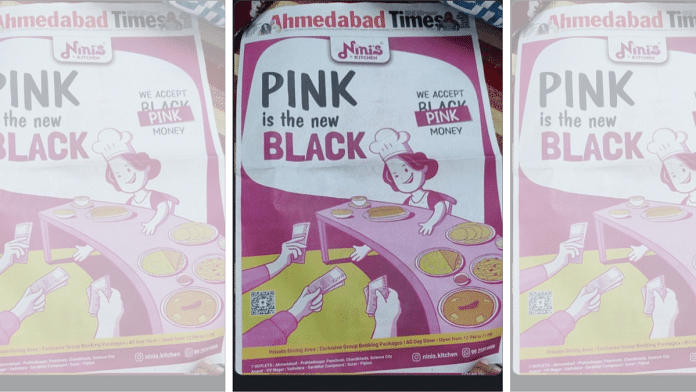New Delhi: Following the Reserve Bank of India’s (RBI) move to withdraw Rs 2,000 notes from circulation as part of its “clean note policy”, restaurants, petrol pumps and apparel stores across the country have reportedly seen an uptick in cash transactions involving the pink note.
Some establishments have used the opportunity by incorporating innovative ideas to attract more buyers who would prefer spending their notes rather than queuing up at banks to exchange them.
For instance, Gujarat-based restaurant Nini’s Kitchen, published a full-page advertisement in Ahmedabad Times Sunday stating that it will accept Rs 2,000 notes.
“PINK IS THE NEW BLACK”, read the tagline of the advertisement, with a cheeky reference to RBI’s clean note policy.
Thirty-six-year-old Ankit Gupta, founder of Nini’s Kitchen, claimed the restaurant has seen a roughly 25 per cent increase in cash transactions since publishing the advertisement in newspapers for the first time on 4 June. It published it for the second time Sunday.
“Due to the popularity of UPI, cash transactions had gone down in all our restaurants for the past few years. But after we published the advertisement in newspapers, we have seen a 20-25 per cent increase in cash transactions, especially the Rs 2,000 note,” he told ThePrint.
Moreover, soon after the RBI’s decision on Rs 2,000 notes, food delivery giants, such as Zomato, claimed they have seen over 70 per cent of their cash-on-delivery orders paid with pink notes.
since friday, 72% of our cash on delivery orders were paid in ₹2000 notes pic.twitter.com/jO6a4F2iI7
— zomato (@zomato) May 22, 2023
However, numerous claims have surfaced on social media of Zomato and Swiggy delivery partners refusing to accept Rs 2,000 notes.
@zomato @zomatocare @letsblinkit the seller asked me to return the products, on giving 2000 rupee note! , He said the company has asked not to take 2000 ruppe note from customers, so he took the products back @RBI #2000RupeesNote #2000rs #2000
— mansi (@manaseeg) May 20, 2023
Meanwhile, some establishments, too, have angered customers by refusing to accept the Rs 2,000 note. For example, in May, a video of an employee in a Nagpur-based eatery arguing with a customer over the use of Rs 2,000 notes went viral, according to a report by Nagpur Times.
In May, the RBI withdrew Rs 2,000 notes from circulation in the country. However, the existing notes continue to be accepted as legal tender until 30 September.
This means individuals can continue to use the notes for transactions, but are encouraged to deposit and/or exchange them at banks before the September deadline.
The RBI’s latest announcement comes seven years after the central government announced the demonetisation of all Rs 500 and Rs 1,000 banknotes. At the time, it stated that this was a strategy to tackle black money.
The government had also issued new Rs 500 and Rs 2,000 banknotes in exchange for the demonetised banknotes, under Section 24(1) of The RBI Act.
(Edited by Richa Mishra)
Also Read: The life & times of Rs 2,000 currency note — a tale of confusion, contradictions by govt



